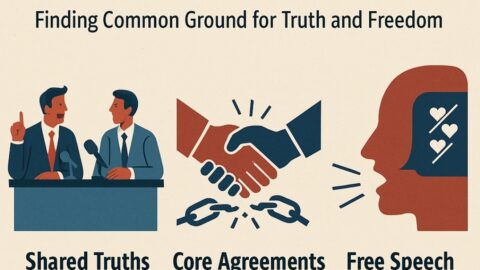When a person passionately dedicates themselves to exposing truths, waking people up from ignorance or cognitive dissonance, and challenging the status quo, it can often lead to them being perceived as a villain by those they care about—family members, friends, or even society at large. This phenomenon occurs because of the natural resistance people have to change, particularly when the truths being exposed conflict with deeply held beliefs, emotional comfort zones, or societal norms.
Cognitive Dissonance and Resistance
Cognitive dissonance occurs when someone is confronted with information that contradicts their beliefs, values, or behaviors. This creates mental discomfort, which people are motivated to reduce, often through denial, avoidance, or rationalization, rather than accepting the challenging truth. When a person tries to “wake others up” from their dissonance, the discomfort can lead to hostility as those who feel threatened by this new information attempt to protect their sense of stability.
- Emotional Defensiveness: People often become defensive when confronted with truths that challenge their worldview. This is because acknowledging the new information may force them to change their self-identity, relationships, or behavior. For example, if a person tries to confront their family with difficult truths about unhealthy dynamics or harmful societal beliefs, the family may reject them, labeling them as the “problem” rather than acknowledging their own flaws. This is a defense mechanism to protect their comfort and avoid cognitive dissonance.
- Projection of Fear and Anger: When people feel cornered by uncomfortable truths, they project their fear and anger onto the messenger. The individual trying to awaken others from their ignorance or dissonance can be seen as an agitator or a troublemaker. The very people they are trying to help may feel attacked, resulting in them turning on the person rather than confronting the uncomfortable truths themselves.
Becoming the “Villain” to Those You Care About
When family members, friends, or society at large turn on someone trying to expose hard truths, it often happens because they view the person as a threat to their stability and security. Here’s how this dynamic plays out:
- Challenging Collective Comfort:
- Breaking the status quo: Most people seek comfort in familiar beliefs, behaviors, and traditions, even if those things are flawed or harmful. Someone trying to wake people up disrupts that comfort, which can feel like a direct attack on their way of life. For example, if a person starts questioning long-held family beliefs or societal norms, they may be seen as rebellious or antagonistic.
- Rejection of accountability: Many individuals do not want to face their own complicity in harmful or unjust systems. When someone points out their role in perpetuating ignorance, whether it’s within a family structure or a broader social context, it’s easier for them to blame the person raising awareness rather than accepting responsibility.
- The Isolation of Being Different:
- Misunderstanding and fear: When someone challenges group beliefs or norms, they are often misunderstood. Their motives can be seen as dangerous or misguided, which breeds fear and distrust. The more an individual pushes to awaken others, the more isolated they may become, because people may not fully grasp the perspective they are coming from.
- Alienation: Trying to wake others up can lead to social or familial alienation. People are often uncomfortable with those who refuse to conform or who consistently point out painful truths. As a result, the person may be ostracized or pushed out of the group. This isolation can feel like betrayal, especially when the intention was to help, not harm.
- Perception of Betrayal:
- Seen as a traitor to the group: When someone turns against the collective ignorance of their community, they are often viewed as a traitor. Whether it’s within a family, friend group, or a nation, the individual who questions or criticizes shared beliefs or traditions may be branded as disloyal. This is particularly true when they expose injustices or moral contradictions that others refuse to acknowledge.
- Shift from protector to enemy: The more someone tries to awaken others, the more they may be seen as attacking the very things others hold dear. For instance, if a person advocates for change within a deeply traditional family or challenges harmful social structures in their community, they may be seen as someone trying to tear down the familiar rather than improve it. Over time, this shift in perception can cast them as the “villain” because they represent an existential threat to the group’s identity and comfort.
- The Role of Fear in Turning on the Messenger:
- Fear of the unknown: Waking up from ignorance means stepping into the unknown. When someone tries to guide others out of cognitive dissonance, they are asking them to question long-held beliefs or assumptions about the world. This fear of change can cause people to lash out against the person trying to open their eyes, turning them into a scapegoat for the discomfort and uncertainty they feel.
- Fear of losing identity: Cognitive dissonance can be deeply tied to a person’s identity. If someone’s entire worldview is built on certain beliefs or values, challenging those beliefs can feel like a personal attack. Family members or friends may turn on someone trying to wake them up because accepting new truths would mean losing a sense of who they are, their culture, or their role in the world.
Historical and Psychological Examples
- Historical Figures as “Villains”:
- Socrates: In ancient Athens, Socrates was put to death for “corrupting the youth” because he encouraged people to question authority, societal norms, and their own beliefs. By trying to awaken his fellow citizens from ignorance, he was seen as a danger to the established order, even though his goal was to seek truth and improve society.
- Galileo Galilei: Galileo was condemned by the Catholic Church for promoting the heliocentric model of the universe, which contradicted the Church’s teachings. Even though he was scientifically correct, society saw him as a heretic because his views disrupted the accepted worldview.
- Psychological Dynamics:
- The Cassandra Complex: This psychological dynamic refers to someone who speaks the truth but is not believed or is actively shunned for it. Named after the Greek mythological figure Cassandra, who was cursed to foresee the future but never be believed, it mirrors the experience of people who try to awaken others from ignorance but are rejected because of fear, denial, or discomfort.
- The “Black Sheep” Phenomenon: In family systems, the person who questions or challenges the family’s collective behaviors, secrets, or dysfunctions often becomes the “black sheep.” This person is isolated or scapegoated because they threaten the family’s emotional equilibrium, even if their insights could lead to healing or growth.
Self-Destruction and Relationship Breakdown
- Self-doubt and frustration: When a person dedicates themselves to awakening others, the repeated rejection and alienation can lead to feelings of self-doubt, frustration, and anger. Over time, this internal conflict may lead them to become embittered or disillusioned.
- Erosion of trust: As people turn on the individual, relationships become strained. The once-strong bonds of family or friendship can erode because people feel threatened by the person’s persistence in challenging their beliefs. Trust breaks down, leading to estrangement.
- Aggression or bitterness: The emotional toll of being labeled as a villain can cause the person to lash out in frustration, further reinforcing the negative perceptions others have of them. What began as a desire to help may spiral into antagonism, as the person feels misunderstood, isolated, and betrayed.
Conclusion
The path of trying to wake others up from ignorance and cognitive dissonance is fraught with challenges. People naturally resist change, and when someone threatens their beliefs or comfort, they may turn on that person, casting them as a villain. This rejection is often rooted in fear, defensiveness, and a desire to preserve the status quo. Over time, the individual trying to bring truth can become alienated and even embittered, transforming from a hopeful reformer into someone seen as a dangerous enemy—despite their noble intentions.







